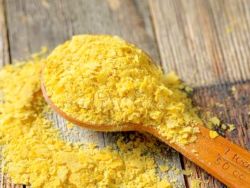
What is Nutritional Yeast And Does It Make Better Bread?

Have you ever come across this yellow-coloured yeast in the supermarket? That’s nutritional yeast! You may be wondering if it stands up to its name. Is it nutritional? Is it yeast? Well, to save you some time, yes, it has a lot of nutrients, and you can add them to a lot of recipes. But no, it won’t make bread rise, yet many vegans eat nutritional yeast regularly. So, what is nutritional yeast? Read on to find out.
Nutritional yeast is a type of yeast that’s been around for many years already. It’s often used by people who are on a plant-based diet because it provides various proteins, vitamins, and minerals. It also contains antioxidants and shows a range of potential health benefits. Nutritional yeast also adds a pleasant nutty, cheesy flavour to cooked foods and baked goods.
What is in nutritional yeast?
Nutritional yeast is a deactivated form of the Saccharomyces cerevisiae microorganism. Of the hundreds of strains, this is the type of yeast commonly used in bread making and it’s grown on molasses and dextrose. The yeast cells are then deactivated during processing, making nutritional yeast an inactive levain.
Types of nutritional yeast
Nutritional yeast comes in two forms: flakes and powder. Both are used interchangeably for various recipes. But powder is often preferred because it has a finer texture than flake form. The flakes look like fish food and are commonly sprinkled over popcorn. They can be found in the bulk section in large grocery stores and some health food stores.
The health benefits of nutritional yeast
Nutritional yeast has no cholesterol or sodium and is very low in saturated fat. It contains carbohydrates and proteins, which are balanced by the presence of vitamins B1, B2, B6 and folic acid. It is low in sodium, saturated fat, cholesterol, fats and proteins.
Nutritional yeast is high in B vitamins. This helps to make red blood cells, aids your nervous system, and supports a healthy heart. It is also high in selenium, a powerful antioxidant. For those watching their waistlines, this one’s for you. A single tablespoon contains only 3 calories, hence the name, nutritional yeast!
Complete proteins. Nutritional yeast contains all nine essential amino acids required by humans. A tablespoon of nutritional yeast also provides 2 grams of protein. This can be an effective way for vegans to add high-quality protein to their meal plans.
Helps Prevent Vitamin B12 Deficiency. One tablespoon of nutritional yeast has 30–180% of the RDI for B-vitamins. It also contains high levels of thiamine, riboflavin, niacin, and vitamins B6&B12.
Contains Powerful Antioxidants. One tablespoon contains 2–30% of the RDI for trace minerals, such as zinc, selenium, manganese and molybdenum. Trace minerals are involved in gene regulation, metabolism, growth and immunity
Contains traces of minerals. A single tablespoon of nutritional yeast will provide 2% or more essential minerals. These traces of minerals play an important role in gene regulation, metabolism, growth and immune system health.
May Boost Immunity. Nutritional yeast contains two main carbohydrates, alpha-mannan and beta-glucan. These have been shown to reduce the frequency of infection from pathogenic bacteria like E. coli and Salmonella.
Potential side effects of nutritional yeast
While nutritional yeast is generally healthy, there are still some drawbacks associated with it.
- Nutritional yeast may cause bloating in some people when consumed in large quantities. Especially if it’s not consumed alongside other foods.
- Some brands of nutritional yeast contain sugar or artificial sweeteners. So always make sure to check the label before purchase.
- A small percentage of people (less than 5%) are allergic to nutritional yeast. Symptoms of an allergic reaction include hives, swelling and difficulty breathing.
- There are nutritional yeast products that may contain compounds like tyramine. This may trigger migraine attacks for some people.
Given these drawbacks, is there anyone who shouldn’t take nutritional yeast?
Unless you have allergies, absolutely no. Nutritional yeast is safe for people of all ages, from babies to the elderly. Just introduce it to your body slowly by taking small quantities at first, and gradually increasing your portions.
Nutritional yeast vs baker’s yeast vs brewer’s yeast
Nutritional, baker’s and brewer’s yeast can all use the same species of yeast. Brewers may use different yeasts depending on the type of beer being made, but Saccharomyces cerevisiae is a popular solution.
- Baker’s yeast: Baker’s yeast is added to bread dough for taste and leavening. The process of baking kills the yeast, which produces an earthy and yeasty flavour in baked goods.
- Brewer’s yeast: Brewer’s yeast can be used for both the creation of beer and as a nutritional supplement. The dead cells from brewing remain after the process is complete. They add a bitter taste but are unpalatable when eaten on their own.
- Nutritional yeast: Nutritional yeast is used solely as a food product. The yeast cells are killed during manufacturing and will not be alive in the final product. It is used to add cheesy, nutty, and savoury flavours.
Can nutritional yeast be added to bread?
Definitely! Nutritional yeast is deactivated, so it will not cause the dough or baked goods to rise. But despite that, it can add and boost flavours in them! It’s often used in nooch crackers, almond cornmeal bread, sourdough and bagels too!
There are many benefits to adding nutritional yeast, although it’s not suitable for every type of bread. Its flavour is powerful meaning you wouldn’t want to use it if you are after a light-tasting loaf. That said, the added depth of flavour and the nutritional benefits mean bread that includes nutritional yeast is a little bit special.
Frequently asked questions about nutritional yeast
If you’ve enjoyed this article and wish to treat me to a coffee, you can by following the link below – Thanks x

Hi, I’m Gareth Busby, a baking coach, senior baker and bread-baking fanatic! My aim is to use science, techniques and 15 years of baking experience to make you a better baker.
Table of Contents
- What is in nutritional yeast?
- Types of nutritional yeast
- The health benefits of nutritional yeast
- Potential side effects of nutritional yeast
- Given these drawbacks, is there anyone who shouldn’t take nutritional yeast?
- Nutritional yeast vs baker’s yeast vs brewer’s yeast
- Can nutritional yeast be added to bread?
- Frequently asked questions about nutritional yeast
Related Recipes
Related Articles
Latest Articles
Baking Categories
Disclaimer
Address
53 Greystone Avenue
Worthing
West Sussex
BN13 1LR
UK







